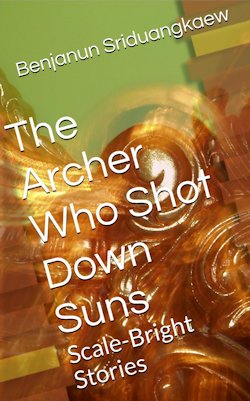Welcome back to the Short Fiction Spotlight, a weekly column dedicated to doing exactly what it says in the header: shining a light on the some of the best and most relevant fiction of the aforementioned form.
One of the highlights of this month for me is the release of Scale-Bright by Benjanun Sriduangkaew, a new novella—the author’s first, in fact—blending “Chinese myth, interstitial cities, and the difficulties of being mortal and ordinary when everyone around you has stepped out of legends.” But before there was Scale-Bright, there was The Sun-Moon Cycle, a trio of long and lustrous shorts published at the commencement of Sriduangkaew’s creative career.
At the time of this writing an ebook collecting the three—‘The Crows Her Dragon’s Gate’,‘Woman of the Sun, Woman of the Moon’ and ‘Chang’e Dashes from the Moon’—is available for free from Smashwords. It’s called The Archer Who Shot Down Suns, and though Scale-Bright is supposed to stand alone, I’d very much recommend the collection to anyone tempted by the novella. And to anyone who isn’t… take my word for it: you will be by the time you’ve read these tremendous tales.
Today, we’re going to take a closer look at ‘The Crows Her Dragon’s Gate,’ which, though the last of the three to be published, takes place a nearly inconceivable period of time before the remaining pair. It’s “an exquisite trap” of a tale about Xihe, the mother of suns.
Depending on how well-versed you are in the mythology Scale-Bright and its sister fictions spring from, you might already know some of her story—that is to say “the legend of how ten sun-crows rose and terrorised the earth with their fatal light [and] how heroic Houyi—heaven’s best marksman, Dijun’s champion—shot them down.” But Xihe herself hardly features in the aforementioned myth… she is merely “the suns’ mother, nothing more, for the function of giving them birth must be fulfilled by some vessel.”
Sriduangkaew’s story casts her as so much more than that, though. “Before the end there would be love-songs to a passion so fierce that the offspring of my body turned into suns; tales of our courtship a wildfire that scorched the world,” but in the beginning, there is only a blameless deity: “a goddess who did not know her way and purpose.” Nor indeed does her husband-to-be:
He was an oddity, not unlike me; that he was without a place at court, without sworn brothers earned through blood and fire. A lack that left him wifeless, for all that women gazed upon him as they would on rare silverwork.
Despite this, Dijun’s romantic advances do not excite Xihe, so when he asks, inevitably, for her hand in marriage, she sets him “a wall so great, a cataract so fierce, that he would never leap high enough.” She request “a light in the night that sheds without heat, winged and strong, tame to me and fierce to all else.” Only then will she consent to be wed.
A clever trick, she thinks. Alas, Dijun is not dissuaded:
Had I a mother she’d have warned me, Your vanity is how men will ensnare you, little daughter—but I gestated in the dreams of birds and left them fully grown: a woman’s silhouette, no childhood behind and no old age before to give it substance.
Too late, Xihe realises that this god is not to be toyed with; that Dijun is determined to have her, no matter what the cost. In short order, he satisfies her arbitrary demands, and they are married—a happy occasion in heaven… for everyone other than her.
After they’re joined in immortal matrimony, Xihe is sullen, and no wonder. This is a mess of her own making, and she hasn’t a clue how to escape her needy husband’s clutches:
I avoided him. I considered cuckolding him so he would cast me aside. It would be scarce challenge to find a fisher boy, seduce him, and rut with him, if the idea did not clog my throat with disgust. Dijun excited me little enough; other men interested me even less.
It’s not overstating the case to say Sriduangkaew’s scintillating stories stand apart from almost everything else the modern genre has to offer: their focus on the unspoken is bolstered by prose so pretty you’ll want to drink it in, like a lavish, sun-lit landscape.
That said, her tales tend to bear a certain resemblance to themselves, in that many of them evidence a particular preoccupation; with matters of romance, in the main. Thus ‘The Crows Her Dragon’s Gate’ is actually rather refreshing. If it’s a love story still, and I suppose it is, it’s an unconventional one, less interested in the pursuit than the pursued—a fine way, if I may, to describe Xihe’s feelings. Like a fawn frolicking in the forest she’s caught, and caged, to make sure she behaves. It’s a sickening situation, and oh, she knows it.
‘The Crows Her Dragon’s Gate’ is a tragedy, in truth, that takes in gender roles, the development of identity and the inevitable end of innocence whilst insisting that the method behind many of our myths may be more insidious than we think. It’s not a happy story, no, but it is a wonderful one, which works double-duty—considering that it is chronologically the first of the four stories in The Sun-Moon Cycle so far—as an introduction to Benjanun Sriduangkaew’s fantastic fiction.
Niall Alexander is an extra-curricular English teacher who reads and writes about all things weird and wonderful for The Speculative Scotsman, Strange Horizons, and Tor.com. He’s been known to tweet, twoo.










